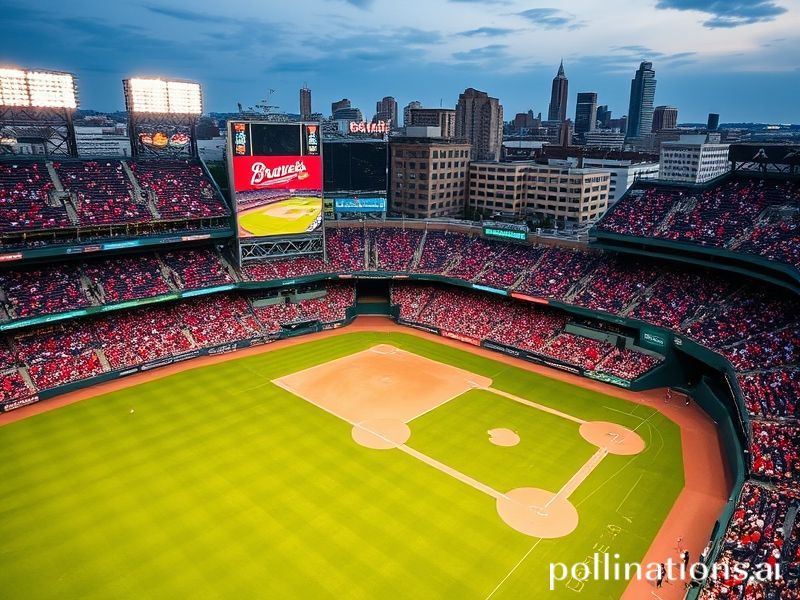Global Eye on Atlanta: How Today’s Braves Game Became the World’s Favorite Distraction
Atlanta’s Braves—today’s sacrificial offering to the baseball gods—step onto Truist Park’s manicured stage at 7:20 p.m. Eastern. In the grand ledger of global affairs, this single Braves game registers somewhere between “mildly diverting” and “utterly inconsequential,” yet the ritual still draws 41,000 carbon-based life forms, plus several million more beaming their anxiety through undersea cables that the Chinese Navy keeps “accidentally” fishing up. The same cables, incidentally, carry footage of Ukrainian drones, Taiwanese semiconductor earnings calls, and a cat in Kuala Lumpur wearing a tiny Ronald Acuña Jr. jersey. We are all very connected now, and equally doomed.
The matchup itself—Atlanta versus whoever happens to be the Washington Nationals’ current roster of interchangeable journeymen—offers a tidy parable of late-stage capitalism. The Braves’ payroll (roughly the GDP of Tonga) dwarfs the Nationals’ (roughly the GDP of Tonga’s parking meters). Yet the league insists this yawning chasm is “competitive balance,” a phrase that translates in seventeen languages to “please gamble responsibly.” DraftKings, FanDuel, and at least three crypto exchanges no one has heard of are sponsoring every half-inning, presumably because nothing says “sound investment” like wagering on a sport where a .300 success rate is considered heroic.
Across the Atlantic, European insomniacs stream the game illegally, not because they care about the Braves, but because watching a sport that still allows chewing tobacco feels nostalgically carcinogenic. Meanwhile in Seoul, baseball-mad office workers debate whether Spencer Strider’s slider breaks more viciously than their own corporate overlords’ promises of work-life balance. The answer, like most things, is encrypted behind a paywall.
Latin America pays closer attention. Venezuela’s state broadcaster cuts away from rolling blackouts—sorry, “electrical load balancing exercises”—to show Acuña’s at-bats, because nothing distracts from hyperinflation like watching a fellow countryman potentially earn your annual salary in one swing. In the Dominican Republic, barrio kids mimic Ozzie Albies’ switch-hitting stance while standing ankle-deep in floodwater that the government insists is “seasonal” and will “definitely not be worse next year.” Climate change, like a hanging curveball, hangs fat and inviting; nobody swings.
Japan’s baseball cognoscenti dissect the Braves’ defensive shifts with the same forensic intensity they once reserved for Godzilla continuity errors. To them, Atlanta’s infield is a living haiku: three infielders on the right, one lonely sentinel on the left, beauty and absurdity in perfect syllabic balance. NHK’s color commentator, himself a retired pitcher who once gave up a homer to Sadaharu Oh, sighs that modern analytics have ruined the romance. He says this while a graphic overlays the screen calculating exit velocity to three decimal places. Irony, like a well-located cutter, is hard to hit.
Back in Georgia, the stadium’s cashless concessions system crashes for the third straight game, forcing fans to barter Apple Pay QR codes like Depression-era hobo nickels. Somewhere, a blockchain evangelist tweets that this is precisely why we need decentralized finance. His tweet receives 2.7 million impressions, zero actual solutions. The Braves lead 3-2 in the fifth when the public-address system announces a “brief weather delay,” which in Atlanta dialect means either a light drizzle or the arrival of four horsemen. Fans shelter beneath the overpriced Chop House bar, nursing $17 beers and existential dread.
When the final out is recorded—usually by some anonymous reliever who will be designated for assignment by Tuesday—the planet keeps spinning. Freight ships still clog the Red Sea, COP29 delegates still haggle over the exact temperature at which coral becomes fondue, and somewhere a Belgian teenager just minted an NFT of Matt Olson’s left elbow. The Braves won or they didn’t; the box score will dissolve into the digital void alongside last month’s Wordle and your fleeting belief that this year might be different.
In the end, tonight’s game is less about baseball than about humanity’s touching insistence on finding patterns in chaos, heroes in laundry, and meaning in a box score. Tomorrow the Braves will play again, the cables will hum, and we will all pretend that nine innings can contain the vast, indifferent universe. Spoiler: they can’t, but the hot dogs are decent and the apocalypse is at least televised in 4K.







